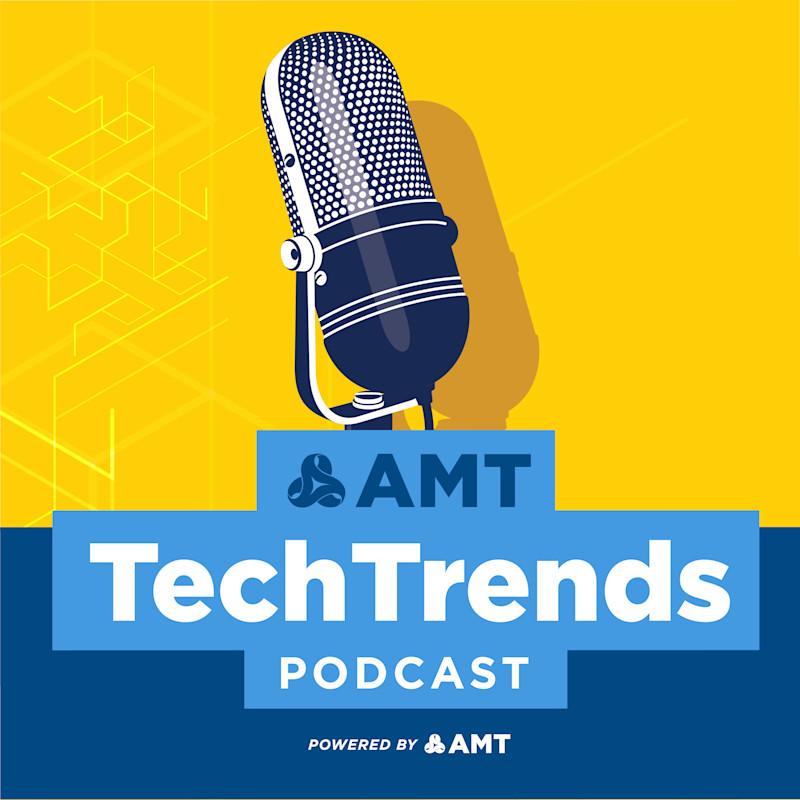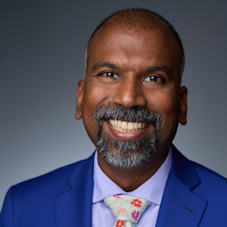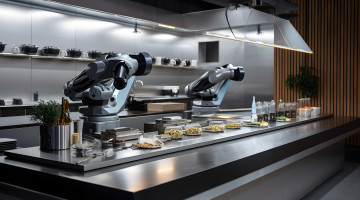Episode 70: Ben and Steve get amped up for their first AMT event in ages! Steve’s excited about receiving a new Pocket NC in the first week of May! Benjamin opens with Amazon’s BILLION-dollar investment in automation innovation. Stephen brings up the US military’s new standard issue rifle. Ben mentions the DoD’s desire to build the largest 3D printed structures. Steve say’s Honda want’s 3D design depositories to take their name out their mouth! Benjamin closes with the blockchain revolutionizing copyright laws.
Tune in to the AM Radio podcast https://www.additivemanufacturing.media/zc/am-radio-podcast
For the latest in Manufacturing Technology news https://www.amtonline.org/resources
Transcript
Benjamin Moses: Hello, everyone. Welcome to the AMT Tech Trends podcast where we discuss the latest manufacturing, technology, research, and news. I'm the director of technology, Benjamin Moses, and I'm here with.
Stephen LaMarca: Stephen LaMarca, AMTs technology analyst.
Benjamin Moses: Steve, how you doing this warm spring day?
Stephen LaMarca: Doing great. It's a fantastic Monday that we're recording this.
Benjamin Moses: Absolutely.
Stephen LaMarca: I had an amazing weekend. Getting ready for MFG this week too.
Benjamin Moses: That's right. We're traveling down to Florida for our conference and I'm pretty excited for that, there's a lot going on.
Stephen LaMarca: Same.
Benjamin Moses: You're doing a lot too. What do you have going on at the conference?
Stephen LaMarca: I mean, I there's lot of good content to go there and absorb, but I can't help but be selfish and only focused on my presentation.
Benjamin Moses: Of course.
Stephen LaMarca: On Thursday I've got one from 11:30 to 11:45, right before lunch convenient enough. I just don't want us screw it up, but it's a great opportunity for me.
Benjamin Moses: Sure.
Stephen LaMarca: I'm really looking forward to it because unlike the podcast, unlike my LaMarkables article section in MT Magazine, unlike the podcast, this is going to be a live presentation.
Benjamin Moses: That's right.
Stephen LaMarca: Nobody's there to edit me. This filter's going to be off.
Benjamin Moses: This could be a problem or it could be fun.
Stephen LaMarca: You can't cut this. Well, I mean, you could fire me but you can't cut that content that's about to come out of my mouth.
Benjamin Moses: Day of correct.
Stephen LaMarca: Yes.
Benjamin Moses: That's exciting. And I'm doing a lot of voice of God and some emceeing for the event too so it's going to be interesting. First time I've had the title, voice of God, I'll stretch that out as long as I can. And I am interested in a lot of the content because it looks at strategy, the economic markets, and people so I was very interested in learning all those things to keep managing the team so it's going to be a fun couple of days.
Stephen LaMarca: It's going to be great.
Benjamin Moses: If you're not able to attend this year definitely check it out for next year, it's going to be awesome.
Stephen LaMarca: Who knows. If you contact Melissa Williamson and renew your AMT membership on time or one of the first 50 or something like that, you'll get a free trip.
Benjamin Moses: That's cool. That's good to remember.
Stephen LaMarca: Get a free trip. I think you can choose MFG you can choose something else.
Benjamin Moses: Lets double-check that one when the video comes out.
Stephen LaMarca: I know, I know. So Melissa did tell me that in preparation for MFG she had to book other people's flights as well. The winners of-
Benjamin Moses: The past [inaudible 00:02:31].
Stephen LaMarca: They do a raffle.
Benjamin Moses: Sure.
Stephen LaMarca: The first 50 to 100, they'll raffle their names and they'll pick one company.
Benjamin Moses: Okay.
Stephen LaMarca: That renewed on time.
Benjamin Moses: That's cool.
Stephen LaMarca: The first 50-
Benjamin Moses: Okay.
Stephen LaMarca: To 100 companies that they'll pick one of them and they'll fly them to any AMT event free of charge.
Benjamin Moses: Nice.
Stephen LaMarca: It's on us.
Benjamin Moses: That's cool. That's a good bonus for-
Stephen LaMarca: Good plug. We haven't done that. We've never plugged a membership.
Benjamin Moses: We'll do that later.
Stephen LaMarca: Nice.
Benjamin Moses: We also got some news on Pocket or testbed. Why don't you-
Stephen LaMarca: Yes.
Benjamin Moses: Give us an update on the [crosstalk 00:03:02].
Stephen LaMarca: We've got a new Pocket NC on the way.
Benjamin Moses: Oh, that's cool.
Stephen LaMarca: We're ramping up testbed activities, dusting it off, getting the robot's vision system up and running but the robot's lonely over there right now. We've said we sent the first Pocket NC to Mexico, they don't want to send it back. They love it. They take it to the trade shows. They do a lot of projects with it.
Benjamin Moses: And this is-
Stephen LaMarca: You and Tim gave me a green light to buy a new one.
Benjamin Moses: That's right.
Stephen LaMarca: This is a new Pocket NC. Yes, it's the same as ... It's very similar to the last one but they've made minor incremental changes and upgrades over the years and it's always made me want the new one. Thank goodness for our Mexico tech center because without them I wouldn't have a valid reason to buy a new one. But I'm really excited not only for that, but Pocket NC as a company, they're going to be at IMTS this year.
Benjamin Moses: Oh, that's cool.
Stephen LaMarca: It's their first time at an IMTS as a company.
Benjamin Moses: Right.
Stephen LaMarca: We brought the Pocket NNC to IMTS first-
Benjamin Moses: That's true.
Stephen LaMarca: To demonstrate MTConnect. That was our testbed, our development environment guinea pig that was the Pocket NC. Funny enough, setting it up or programming the MTConnect agent and adapter for the Pocket NC was very similar to an existing agent and adapter for a Mazak machine.
Benjamin Moses: That's cool.
Stephen LaMarca: They had to relabel a few axes that they ... That were obviously different. But they're obviously two very different machines. But say what you will about Pocket NC having originally been a prosumer advanced hobbyist machine for light production, they're at IMTS this year. They're going to be at IMTS this year for a reason, Benjamin.
Benjamin Moses: I saw them on the exhibitor list. It's exciting.
Stephen LaMarca: I'm going to stop there because the co-founder asked me not to share any more information.
Benjamin Moses: Oh.
Stephen LaMarca: And I've already ... And not to go public with it which I've just broken.
Benjamin Moses: It'll be exciting.
Stephen LaMarca: It's going to be a great IMTS this year.
Benjamin Moses: Awesome. Let's get into some articles, shall we?
Stephen LaMarca: Yes, we shall.
Benjamin Moses: I'll kick it off. Everyone's favorite company, Amazon. Well, favorite marketplace.
Stephen LaMarca: I guess.
Benjamin Moses: It's interesting. The article I'm really interested in ... So they have an innovation fund that they're starting up.
Stephen LaMarca: Right.
Benjamin Moses: Of course, they try and flex how big they are.
Stephen LaMarca: Right.
Benjamin Moses: So the title is, Amazon Launches $1 Billion Industrial Innovation Fund. That's a lot of money.
Stephen LaMarca: That is a lot of money. Not as much money as 44 billion though that Musk just dropped to buy Twitter outright but it's enough for a different time.
Benjamin Moses: That's a different time. So Amazon's looking to foster innovation and supply chain, fulfillment logistics, right, the core business. And they started this innovation fund. And the first round of it, it looks like they sponsored about five or six companies. And they're looking to support and foster innovation of companies throughout any life cycle, right. These are probably more startup phase companies but are looking to look at more mature companies, help drive new technologies. So the first round they have a company for wearable tech, for the warehouse employees. Computer vision, of course, getting back to warehouse fulfillment.
Stephen LaMarca: Of course.
Benjamin Moses: Bipedal robotics. I thought that was interesting.
Stephen LaMarca: That is really cool.
Benjamin Moses: Autonomous robots capable of floor to ceiling grasp. They probably have 20-foot-tall shelves, right, so they have robots to be able to pick from all of those options, all of those heights. And the last one felt a little collaborative robot, even the video that I saw. So robotic arm to work cohesively with humans. I'm interested where they're headed at that's different than some of the other current use cases in mostly industrial spaces I've seen. It's interesting.
Stephen LaMarca: We want to see their use case.
Benjamin Moses: I definitely need to see their use case. And I'm curious to see how well Amazon's help mature these companies, not just with obviously funding, but funding could come out through projects within Amazon so I'm very interested to see how they go about supporting these projects.
Stephen LaMarca: That's pretty big that ... I mean, number one, Amazon uses a lot of robots.
Benjamin Moses: Yes.
Stephen LaMarca: They evolve like the big Fortune 500 companies out there. I feel like, at least in part, the media would lead you to believe that they probably use the most robots.
Benjamin Moses: Sure.
Stephen LaMarca: And they use the most robots with a lot of humans around. Other than a car manufacturer-
Benjamin Moses: Right, right.
Stephen LaMarca: That's probably true.
Benjamin Moses: And this is a broad sense of robotics also, right, so it's not just a robotic arm, right. [crosstalk 00:07:54].
It's huge.
Stephen LaMarca: I always call robots and automation a foundational technology.
Benjamin Moses: Right.
Stephen LaMarca: But the foundational technology to the foundational technology is the vision system.
Benjamin Moses: Sure.
Stephen LaMarca: So it's huge that they're putting money into vision systems. I'm really curious ... Like you, I think the most interested thing I'm in is their use case for collaborative robots.
Benjamin Moses: Right.
Stephen LaMarca: Because collaborative robots have this fascinating ... We all know what they are and that they're incredible-
Benjamin Moses: Right.
Stephen LaMarca: But we haven't seen a solid use case for them yet.
Benjamin Moses: That's different then.
Stephen LaMarca: They're awesome.
Benjamin Moses: Right.
Stephen LaMarca: But we don't know ... How can they actually be productive? How can they actually be implemented? We've seen more implementation of additive than we have collaborative robots.
Benjamin Moses: Sure.
Stephen LaMarca: I can't wait to see more use cases of cobots.
Benjamin Moses: I got you.
Stephen LaMarca: And that's going to be ... Amazon's going to be leading the way with ... As much pain as it is for me to say that, it's going to be really cool because collaborative robots are just ... I see them as this really fancy high-end paintbrush or Fusion 360 by Autodesk, but you have to know how to use it first.
Benjamin Moses: True, true.
Stephen LaMarca: And collaborative robots are in that wheelhouse.
Benjamin Moses: And that's interesting. To get to a collaborative robot you have trade-offs on speed and weight capability-
Stephen LaMarca: Right.
Benjamin Moses: For allowing a human to be close. So the value of that versus something that's faster has more capable. It's always an interesting discussion within our automation and manufacturing committee, right. They always wonder why would you drive that way or drive a design that way for using collaborative when there's other options for including safety. It's interesting. We'll see what happens. You've got one on big news from the military.
Stephen LaMarca: We've got two defense.gov articles today.
Benjamin Moses: That's true.
Stephen LaMarca: Two things from the DOD. This one's five days old, but I figured you and I definitely want to talk about this. The U.S. Military has a new machine for the distribution of Lake City Quiet Pills. Boys and girls, there's a new standard issue rifle-
Benjamin Moses: That's right.
Stephen LaMarca: Being adopted by the military. The SIG Sauer XM5, which I'm sure because it's been adopted now I'm sure it'll drop the X soon.
Benjamin Moses: Right.
Stephen LaMarca: We'll have XM5 rifle and the XM250 automatic rifle, which will be replacing the M16, M4 rifles, and the XM250 those will be replaced by the XM5.
Benjamin Moses: Right.
Stephen LaMarca: And the M249 squad automatic weapon will be replaced by the XM250.
Benjamin Moses: Right.
Stephen LaMarca: This is wild because they are adopting a new cartridge as well. They're dropping the 5.56 NATO-
Benjamin Moses: Right.
Stephen LaMarca: And they're going with the 6.8 x 51 mm. The military already uses a 51mm casing-
Benjamin Moses: Right.
Stephen LaMarca: For the 762 x 51 mm and that's been around forever. It's an adaptation of the .308 Winchester hunting ... A deer rifle cartridge effectively, short action deer rifle cartridge. And they're necking it down to a 6.8 or in American a .280. Let's go back to the trials for the M14 pre-Nam when NATO was trying to adopt a standard-issue full-size rifle cartridge, the U.S. influenced NATO to adopt 762 x 51, the .308.
Benjamin Moses: Right.
Stephen LaMarca: The British honestly had the more advanced cartridge, the better cartridge. Lower recoil, longer range, better stopping power. The .280 British. We said no to that and we controlled NATO.
Benjamin Moses: We've come full circle.
Stephen LaMarca: And now we're going back to a .280 but we are using the 51 mm case so that's cool.
Benjamin Moses: And I really like where they're headed with this because there's a couple things, also with the ammo. So they are using a different caliber.
Stephen LaMarca: Yes.
Benjamin Moses: But the cartridge itself is different because they're using by bi-metal cases so it's a steel core near the-
Stephen LaMarca: It's steelhead.
Benjamin Moses: Steelhead, that's right.
Stephen LaMarca: And they're still using brass because, like I said in a previous episode, brass is the best for heat retention-
Benjamin Moses: True.
Stephen LaMarca: In the casing. And when it ejects the casing you're ejecting that heat as well.
Benjamin Moses: So they're able to drive the pressures up higher because of the steel-
Stephen LaMarca: With the steelhead.
Benjamin Moses: Steelhead.
Stephen LaMarca: Safely too.
Benjamin Moses: Right. The other one is ... I think all the guns are coming standard with suppressors or silencers. That's what I saw. If they go down that path I know SIG experiment is significantly with 3D printing suppressors so-
Stephen LaMarca: They have.
Benjamin Moses: We'll see that in the manufacturing space. And they're doing a lot on the optic side too. So I don't know who they partnered with but there's a lot of calculations, a lot of information that's being displayed in the optic itself.
Stephen LaMarca: I mean, I have no idea what work they've been doing, but SIG has one heck of a bribery department. I mean, lobbying department because everything that the U.S. Military has adopted lately has all been SIG.
Benjamin Moses: They did the pistols also, that's right.
Stephen LaMarca: They did do the pistols.
Benjamin Moses: That's interesting.
Stephen LaMarca: One last piece of good news is that even though it is a lot of people, including myself, were like why? They've taken 65 years to protect or to perfect the AR-15 platform-
Benjamin Moses: Right.
Stephen LaMarca: Design of rifles. Why would they go away from that? The good news is this new ... The XM5 and XM ... Well, they're just the lower receiver of the XM250, but the XM5 rifle is an AR-10.
Benjamin Moses: That's cool.
Stephen LaMarca: So they're still sticking with a similar direct impingement but not really direct impingement, it's really an internal gas piston design.
Benjamin Moses: Right.
Stephen LaMarca: Well, actually XM5 might be piston-driven. I have to look into that. The upper and lower are very similar to an AR-15 but more relatable to an AR-10 design. So this is huge because if you didn't know the AR-10 and SR-25, the .308 style, AR-15s, have never been standardized because they've never been adopted.
Benjamin Moses: Right.
Stephen LaMarca: Well, with exception to the X ... The M110-
Benjamin Moses: Right.
Stephen LaMarca: And the SR-25 by the seals, which became the X ... The Mark 11. Those rifles were never standardized for standard issue.
Benjamin Moses: Sure.
Stephen LaMarca: So there's no standard large caliber AR-15 or AR-10 platform rifle, this is making it standardized. There will be officially a Mil-Spec AR-10 effectively now which is cool.
Benjamin Moses: I got another article from Department of Defense.
Stephen LaMarca: Okay. Nice transition.
Benjamin Moses: The U.S. DOD to build the largest 3D printed structure in Americas.
Stephen LaMarca: That's sick.
Benjamin Moses: This is from a 3D Printing Industry. What they're looking to do is build three separate structures, each one 5700 square feet, it's 5,700 square feet, so that's a fairly large structure. And they're considering these as temporary barracks so I feel like they're experimenting. And one of the ... To your point of standards, one of the things that allow them to do this was there's a unified facilities criteria and they opened up that criteria to allow companies to additively grow houses.
Stephen LaMarca: Nice.
Benjamin Moses: So what they're doing is they're working with a company called ICON to build-
Stephen LaMarca: Oh man, ICON again.
Benjamin Moses: To build these houses ... Or these barracks. And also with their research and development side in the Army to understand the impact of this concrete that they're using. And that's the same with any other additive 3D printing process where not only are you getting into the process but the materials associated with that process. So ICON has their own special concrete that they're using and to build these large structures. So I'm interested to see how far this goes particularly ... I mean, everyone assumes that Department of Defense moves fairly slow, but I think with the little private industry pushing this behind we'll ... We could definitely see new temporary buildings being printed, I wouldn't say in the forward operating base, but definitely far behind that. We'll see.
Stephen LaMarca: Very cool.
Benjamin Moses: Between new weapons and new buildings, Department of Defense is killing it.
Stephen LaMarca: I hope.
Benjamin Moses: You got something?
Stephen LaMarca: Maybe that was the wrong choice of words.
Benjamin Moses: Maybe. Maybe.
Stephen LaMarca: Whatever.
Benjamin Moses: You got something on a Honda?
Stephen LaMarca: I got something else from 3D Printing Industry. Honda issues, officially issues, printables with takedown notice for all Honda-related 3D models. So printables is very similar to GrabCAD.
Benjamin Moses: Right.
Stephen LaMarca: With exception that printables is actually a ... I forget what they were originally called, but printables is Prusa's GrabCAD.
Benjamin Moses: Sure.
Stephen LaMarca: Prusa being a hobbyist consumer-grade 3D printing company. They have a depository of designs that anybody can create an account and log into and share designs. But it's a company ... It's funded by a company, a 3D printer company, and Honda ... A lot of the users on there are making things like trunk latches or door hinges for their cars.
Benjamin Moses: Stuff that breaks easily.
Stephen LaMarca: Stuff that breaks easily. Door handles for a '93 Civic I guess.
Benjamin Moses: Where are you going to get that from?
Stephen LaMarca: Cars I think are supported only ... Well, I think the U.S. government mandates that cars, any car model, its final model year has to be supported up to 10 years after its final production run. So let's say the '93 Civic was the last Civic of that generation Civic, it has to be supported until 2003.
Benjamin Moses: That's it.
Stephen LaMarca: And there's a lot of old Civics out there.
Benjamin Moses: Those things keep going.
Stephen LaMarca: Those things keep going. But Honda doesn't have to continue to make parts for them so naturally, a lot of 3D printers are all over the place now. People are making parts for their old Accords and Civics and whatnot. And Honda's got beef with this because, of course, they do.
Benjamin Moses: Right.
Stephen LaMarca: I'm not going to speak ill, I love Honda. But I mean-
Benjamin Moses: They don't like it.
Stephen LaMarca: They don't like it. I don't blame them. Who wouldn't? But I mean, really. Nevermind. I'm with them.
Benjamin Moses: You think they're heading in the right direction. So that gets into-
Stephen LaMarca: They could publicize it better. They could be like hey-
Benjamin Moses: Chill.
Stephen LaMarca: There is something they could do to make them look better in this situation.
Benjamin Moses: Oh, yeah. Definitely.
Stephen LaMarca: I get where they're coming from but they could do it better.
Benjamin Moses: And the market for licensing objects to print its-
Stephen LaMarca: Just like they could make better formula one engines, just saying.
Benjamin Moses: Oh. So the ability to license objects to be printed, that's growing significantly. I see that in a lot of tabletop games, little miniatures, where you can download something and then print yourself or have someone else print it for you. So there is an ecosystem that exists in that manner so I agree with you that Honda took a specific path to just say, "Take everything down," which limits you, right. If you have a windshield wiper fluid cap that needs to be replaced, I mean, are you really going to try and get that from a dealership or look online, go to a junkyard where if you have the ability to print it, right, are you really hurting anyone? Maybe the other option for Honda was to say, "Hey, let's allow people to buy the CAD file for 10 bucks and then let them print it."
Stephen LaMarca: I mean, is there an alternative that they have ... An alternative solution for their owners to replace these parts?
Benjamin Moses: I don't know.
Stephen LaMarca: Probably not.
Benjamin Moses: Probably not.
Stephen LaMarca: Probably be like why don't you buy a new car nerd which is really rude, not every everybody is balling and can afford a new car these days, especially when they can't even make their silicon chips.
Benjamin Moses: And that gets into one of the ... The last article I have is not my favorite technology but it's an interesting look at where we are in terms of self-serve manufacturing let's say.
Stephen LaMarca: Okay.
Benjamin Moses: Blockchain tech to revolutionize copyright laws for 3D printing.
Stephen LaMarca: Perfect segue.
Benjamin Moses: Now there's a universe ... It's still in university research. What they're doing is a team of experts from Exeter Law School ... Interesting. Over in the UK, have patented watermarking technology for use for 3D printing. So one of the things they did before this was be able to imprint a mark on your 3D printed part, just like you would a watermark, a paper, or something like that.
Stephen LaMarca: Or a meme.
Benjamin Moses: A meme. Now they're working to link the watermark technology to blockchain to allow licensing of 3D objects.
Stephen LaMarca: Got you.
Benjamin Moses: So the idea ... And we've talked a lot about this.
Stephen LaMarca: Why don't they just say it?
Benjamin Moses: What's that?
Stephen LaMarca: They're trying to make NFTs.
Benjamin Moses: Fair. But the idea of people want to be able to print their own objects and being able to create a ecosystem prior to that, that I need to get the CAD file. I need to get the 3D, the digital model of what I want to print, and coming up with a suitable economy for everyone to exist happily, right. Right now people are afraid to share data, people are concerned that if I download this file then it's going to disappear, which is completely fair. I mean, that's the same issue we have in the music industry. But if we're able to create this ecosystem where the creators can benefit, the people that are downloading can benefit, and the printers can benefit. Obviously, there's going to be some people that just don't want to spend any money, that's true for anything, so there will be people trying to get around that. So I'm interested to see where this goes. I'm not a big fan of using the blockchain because it ... Some of these CAD files are big, and being able to store large files is not blockchain's core capability.
Stephen LaMarca: Right.
Benjamin Moses: We'll see.
Stephen LaMarca: I used to speak ill of blockchain, but it was because I mostly didn't understand blockchain. And to be fair I still don't.
Benjamin Moses: Nobody still does.
Stephen LaMarca: But then NFTs came out. And just like blockchain, those got just as much flack if not more-
Benjamin Moses: Right.
Stephen LaMarca: Flack. If you take a step back and you look at it, and the current use case for NFTs, the current ... And I want air quote, investment potential for NFTs is awful right now-
Benjamin Moses: Right.
Stephen LaMarca: And totally misunderstood. And you've got people with way too much money and way too little brains thinking that these pictures of apes are actually worth a lot of money. And while that's true, that's dumb and that's a terrible investment, NFTs might not be.
Benjamin Moses: Right.
Stephen LaMarca: NFTs if done right are a successful implementation of blockchain technology.
Benjamin Moses: Right.
Stephen LaMarca: And NFTs are a better way to understand blockchain. And if we can successfully implement NFTs into file transfers-
Benjamin Moses: Sure.
Stephen LaMarca: And selling of digital twins to customers, then we have a viable use case. It's a lot of mental effort or lack thereof is being misplaced right now.
Benjamin Moses: Right.
Stephen LaMarca: There's potential. There still needs to be more education and understanding developed. There are people who definitely have that understanding of it, but it's the masses still don't understand it yet.
Benjamin Moses: Right.
Stephen LaMarca: I used to be one of those people that talked a lot of smack about it.
Benjamin Moses: Sure.
Stephen LaMarca: But I think this technology, at blockchain and thus NFTs, are in our future.
Benjamin Moses: Right.
Stephen LaMarca: Just not yet and probably not for a while, and somebody big needs to do it right first.
Benjamin Moses: Sure.
Stephen LaMarca: And we're still far from that.
Benjamin Moses: And it gets back to the valley, right. And just having pictures that you could ... That NFTs that's-
Stephen LaMarca: But maybe there's an NFT of your attendee ticket to IMTS 2022, that way somebody else can't show up to the door and get in using your name and your stuff because they had ... They broke into your email and got a copy of your email ticket, your attendee ticket. I don't even know if IMTS works that way, but with NFTs you could prevent that from happening.
Benjamin Moses: Sure.
Stephen LaMarca: You could have two-factor authentication, I guess, for your movie ticket or wherever.
Benjamin Moses: There's a lot of hypotheses going on here lets-
Stephen LaMarca: They're not hypotheses it's potential.
Benjamin Moses: Potential. Are we done, Steve?
Stephen LaMarca: Yeah.
Benjamin Moses: We covered a lot, man. We covered a lot of military stuff. We talked about Amazon spending a billion dollars over a certain amount of timeframe, let's be honest with ourselves, and then blockchain. A variety of stuff but a lot of potential future. Today's episode is a glimpse of the future. A lot of potential.
Stephen LaMarca: I guess.
Benjamin Moses: Are you scared about it?
Stephen LaMarca: Yeah. I don't think I should be.
Benjamin Moses: Steve, where can they find more info about us?
Stephen LaMarca: AMTonline.org/resources.
Benjamin Moses: Awesome. Bye, everyone.
Stephen LaMarca: Bye.









